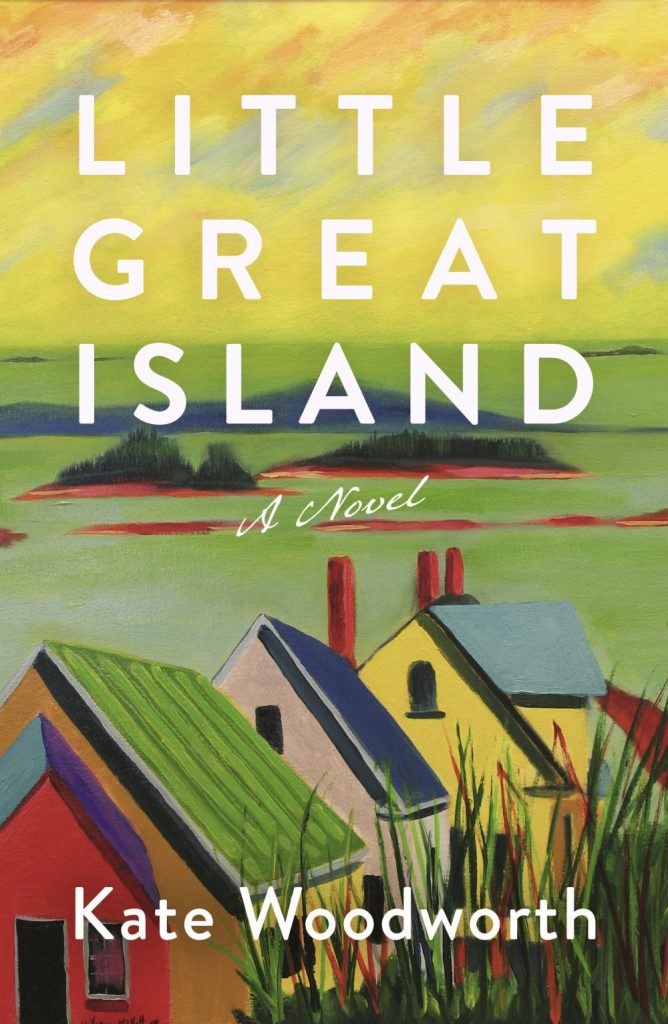On Little Great Island, “a tiny change is felt by everyone, which means everyone has an opinion.” And they can be noisy about it. The sale of a house by a family which has summered there for over 40 years is hardly tiny. Neither is the sudden return, after 10 years, of a prodigal daughter with her 6-year-old son, especially to her parents struggling to make ends meet as the lobster catch goes south (or more accurately, north).
Kate Woodworth’s “Little Great Island” is set on a fictional island 14 miles off the Down East coast. The people and places she describes bring the Fox Islands irresistibly to mind, so it is no surprise to learn that North Haven has “a very special spot” in the author’s heart; she lives in Arlington, Massachusetts. Woodworth is a retired medical writer whose fiction and nonfiction pieces have appeared in numerous literary journals. This is her second novel.
It’s early April as the story begins. Mari and her son arrive back on the island, running away from an abusive religious cult. On the same boat is Harry, still trying to accept his wife’s death two years before, coming early to the island to clean out the family house before selling it. Both are emotionally shattered. As the island prepares for the annual arrival of the summer people, their quite different — but achingly similar — needs stir up dormant resentments all around.
Grieving Harry is hurried into negotiations with a mainland developer who wants to turn his land into a high-end executive retreat, and the cat is among the pigeons. He finds himself torn between his own values (though dampened still by sorrow); the environmental ideals of uncompromising Mari; the old-fashioned, patrician ideas about land preservation of another long-time rusticator; and the lure of quick money the development might (or might not) bestow on the island. Will Little Great Island choose economic stability over quality of life? Mari thinks she has a plan to have both.
Within this serviceable but didactic, even activist, frame, the characters who drive the plot are what makes “Little Great Island” such a good book. As the principals, Harry and Mari are joined by a cast of extraordinarily believable supporting characters, all with their own “opinions,” their own flaws and regrets, and essential human decency: Mari’s parents, another summer widower, the owner of the island market and his children, etc. Woodworth has constructed her plot so that 11 points-of-view have recurring chapters throughout the book. Plus one more: Periodically, the island itself, immune to mortal frailties, speaks in lapidary, finely honed sentences.
The author classifies her book as cli-fi. She is an active member of the Climate Fiction Writers League, whose members seek to promote action to stop climate change through their books. It is very much to her credit that Woodworth manages to keep her activism from overwhelming her story. The fact that lobsters are declining due to climate change is an integral part of the story, not an environmental teaching moment.
Very occasionally, I winced at an undigested bit of messaging, for instance when the old-time patrician says, “A farm destroys natural habitat. It disrupts migratory pathways. It involves fertilizers and pesticides and noise, all of which upset the environment.”
Much more characteristic of the book are the little things that demonstrate the author’s keen eye for telling details: a midnight kitchen is “lit by the vigilant eyes of appliances;” the fearful climax of a family argument is underscored as the “refrigerator motor switches off. Even the faucet ceases dripping.” She also has deep empathy and understanding for her characters, both summer people and islanders. An islander “pretty tight-lipped, saying only that newcomers using the ferry had better follow the rules” is pitch perfect.
According to Woodworth, climate fiction by itself is not leading to the kind of action she and other cli-fi writers had hoped. So, with the launch of her novel, she has introduced an initiative called “Be the Butterfly” (a reference to the butterfly effect, which also features in her story). Her readers are encouraged to “perform one small act or behavioral change to help mitigate climate change.” To help them on their way, she has lined up dozens of well-known authors who suggest a nonprofit they trust to get things done. Details are in the book. It’s a great idea, and “Little Great Island” is a great read.
Thomas Urquhart is a former director of Maine Audubon Society and the author of “For the Beauty of the Earth.”
